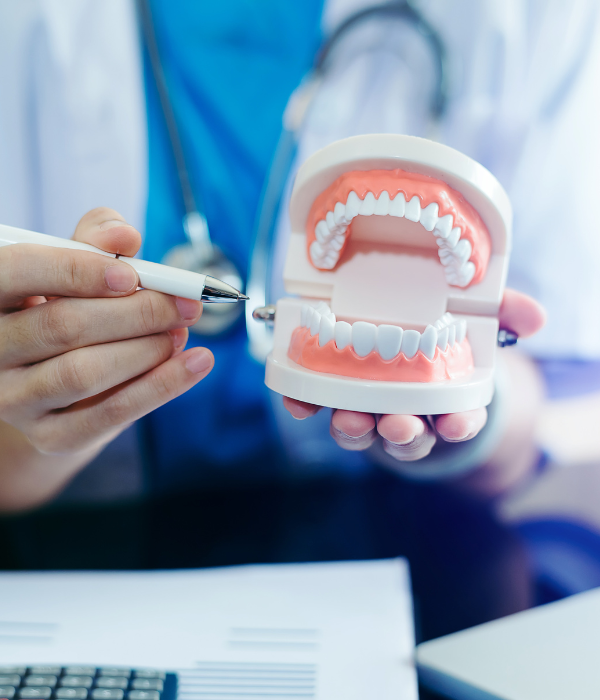

Why are Dental Crowns Needed?
If there is a deficiency in one or more of your teeth in terms of strength, shape, functionality, or other aspect of its appearance, a dentist may recommend dental crowns. Despite why a crown may be needed, it typically serves the dual purposes of protecting the tooth from further damage while also improving its appearance.
Do I Need Dental Crowns?
The dentist will tell you if you do indeed need a dental crown. However, thinking you need a dental crown may not be what brings you into the office. Instead, the visit may be prompted by complaints about any of the following:
- Tooth pain
- A visibly cracked or broken tooth
- Inconsistent height of teeth
- Inconsistent gaps between teeth
These are the things a patient may experience that could lead them to make an appointment with a dentist. However, once a dental professional does a thorough examination, possibly including x-rays, they may recommend a dental crown due to:
- Camouflaging a failing tooth by pairing it with an implant
- Supporting a large filling that takes an unproportionate amount of the tooth
- Strengthening a tooth exposed to root canal therapy
- Holding a dental bridge in place


What Are Dental Crowns?
A dental crown is basically a hollow cap of sorts that is shaped like a tooth and fits over the top of it and butts up against the gum line. Temporary crowns are usually made from stainless steel. Permanent crowns can be made from a variety of different materials such as:
- Metals. Patients who consider metal crowns often do so because of their durability and strength. However, they are one of the more expensive options. Those with metal allergies should avoid these crowns.
- All Ceramic or porcelain. This version of dental crowns is popular because it can be customized in a special laboratory to closely match the shade of a patient’s teeth.
- Porcelain fused to metal. This type of crown can also be customized to match the patient’s adjacent teeth allowing for a natural appearance, but it can wear down easier and may be prone to chips and breaks.
- All-resin. This material can be more cost effective than other options, but some patients report that all-resin can be more susceptible to fractures and wear down faster.
What Patients Can Expect If Getting a Dental Crown
If a visit to the dentist yields a recommendation for a dental crown, patients can expect the process to take approximately two or more visits. If a patient chooses to have a crown made of a material such as ceramic that can be made on machinery at the dentist, it may only take one appointment. However, those choosing dental crowns that are customized to match the shade of their other teeth should expect it to take two visits.
There are multiple steps in preparing a tooth or teeth for dental crowns. An updated physical examination of the tooth will be performed, and x-rays likely taken to ensure that a root canal is not needed before a crown is placed.
Any existing decay on the tooth should also be removed. If the decay or damage is so extensive that much of the tooth is missing, it may require the dentist to first use a special material to build up the tooth so that the use of a crown is possible.
If no root canal or additional measures are needed, the affected tooth should first be slightly ground down and shaped in a way that will accommodate the crown to fit over it. Patients who choose to have their crown customized by a laboratory will also be asked to give teeth impressions to aid with the proper formation of the crown.
Since the affected tooth has already been ground or filed down, it will require a temporary crown until the permanent one is ready. The temporary version is put in place with temporary cement and protects the tooth while still allowing for a patient to eat most foods within reason. Patients may, however, be asked to avoid particularly chewy or hard foods until their permanent crown comes in.
Once the customized permanent version is delivered to the dentist, the patient will be asked to come back in so the fit and color can be examined. Once the crown is deemed acceptable, the dentist will use a local anesthetic to ensure the tooth is numb. This will minimize any pain associated with cementing the permanent crown in place.
While dental crowns are designed to improve a patient’s dental health, it is possible that patients may experience some minor issues with them over time. Immediately following the installation, a patient may feel some discomfort or sensitivity to cold or hot temperatures in the affected tooth. It is also possible for a crown to become chipped. If the chipped area is small, it might be able to be fixed. Larger and more complex chips in a crown may require a replacement.
Although it is relatively rare, it could be possible for a crown to come loose or fall off. This is usually due to the degradation of the cement that was holding the crown in place. Whether a crown is loose or completely comes off, it requires immediate attention by the dentist to avoid further complications.
When taken care of with proper daily hygiene like brushing and flossing, dental crowns could potentially last up to fifteen years. The life of a dental crown largely depends on the material a crown is made of, how a patient cares for their teeth, and other patient lifestyle choices such as chewing ice or clenching teeth.
If you have questions about dental crowns or believe that you may be in need of one, do not give the situation a chance to worse and grow more complex. Call a reputable dentist today to make an appointment and have your teeth professionally examined.
